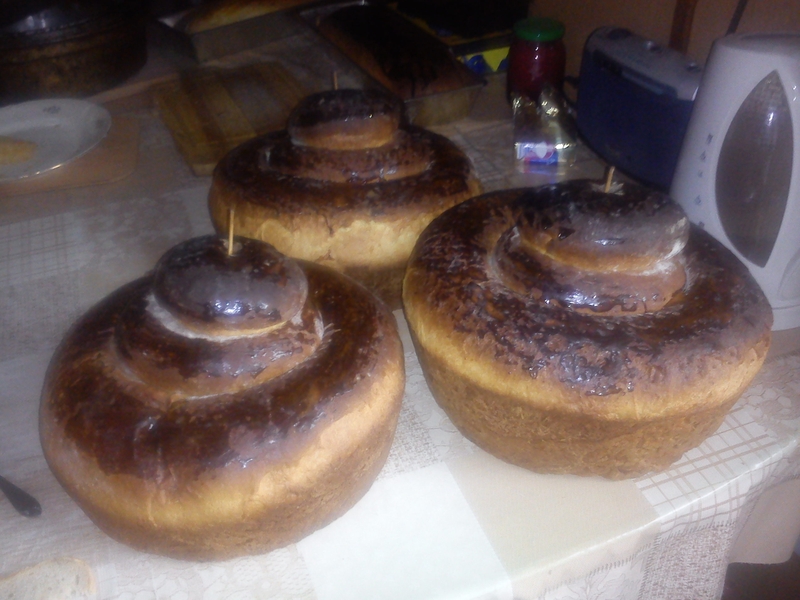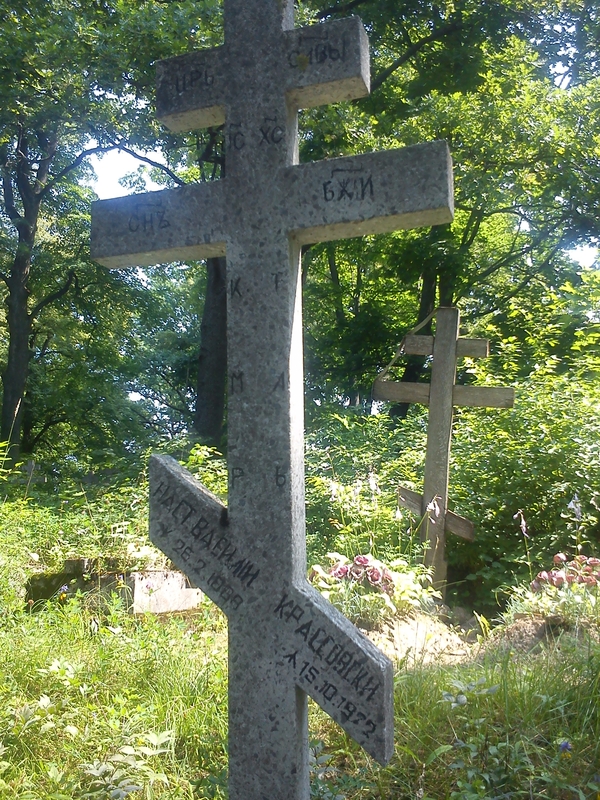dialect of Old Believers in Masuria
Fragments of Masurian Old Believers’ texts
Pascha recipe
Pascha is a traditional yeast cake that Old Believers bake at Easter. It has layers made of three balls of dough placed on top of one another, called heads. The smallest ball is placed on top. In order for a pascha to have proper shape and to grow straight up, a long thin stick is inserted, which the dough ‚climbs‘ in the process of baking.
Traditional Easter pascha baked in Old Believer families in Masuria (Photo: A. Jorroch).
Below is a fragment of an Easter pascha recipe. The recipe was given by a middle-aged Masurian Old Believer, born in early 1950s.
/Wie heißt der Kuchen?/
(Eng. What is this cake called?)
Pascha. Braucht man M’ehl, H’efe, Zucke, Zucke, Milch, Zitronen, Butte, dann zuerst zuerst warm ich die Milch an und dann kommt die Butte rein, Zucke un das must alles auflassen. n das auflasst…/Wie lange dauert es?/
(Eng. Pascha. You need flour, yeast, sugar, sugar, milk, lemons, butter, then first I warm the milk and then the butter comes in, sugar and all that must melt. When it melts...)
(Eng. How long does it take?)
Na alles auflasst, is alles flissig un das darf nicht heiß sein, muss abkihlen, muss abkihlen un denn schlage ich Eier rein auch damit, Eier, da is für eine Pascha dann brauche, nich, fünf sechs Eie (…)/Machen wir die nur zu Ostern?/
(Eng. Well you melt everything, everything is liquid and it cannot be hot, must cool down and then I crack the eggs in, the eggs, well for one pascha I need, no, five, six eggs (…))
(Eng. Do we make it at Easter?)
Nu zu Ostern, andes gelingt sie nicht./Un mit dem Mehl, wenn das ist warm, dann musst du abkühlen?/
(Eng. Only at Easter, otherwise it doesn’t work.)
(Eng. And with that flour, when it’s warm, then you must cool it down?)
Is flissige muss abkihlen un dann mach i auseinande H’ efe./Und Milch?/
(Eng. It’s liquid, must cool down and then I add yeast.)
(Eng. And milk?)
Mit Milch mit Zucke mit Zucke. Milch, Zucke, Hefe und ein paar Salz, sonst anders tut man sich schw’ er arbeiten.
(Eng. With milk with sugar with sugar. Milk, sugar, yeast and a couple [some] salt, or otherwise it’s hard to knead [the dough].)
Personal names
Names are very important in Old Believer communities. A newborn child would be given the name of the saint patron of the ninth day after the child’s birth. However, due to the language of official administration, some discrepancies might appear between baptismal names and names used later in everyday life. For that reason both Russian, German, and Polish names may be seen on gravestones in Old Believer cemeteries. (For more information on Old Believers’ names and gravestone inscriptions, see Magdalena Ziółkowska, 2010: 189-200 Ziółkowska 2010 / komentarz/comment/r /
Ziółkowska 2010 / komentarz/comment/r / Ziółkowska, Magdalena 2010. „Antroponimia polskich starowiercόw (na podstawie inskrypcji nagrobnych)” w: M. Głuszkowski & S. Grzybowski (red.). Staroobrzędowcy za granicą. Toruń: Uniwersytet Mikołaja Kopernika. 189-200.
 ).
). Below is a fragment of a conversation with a member of the oldest generation of Masurian Old Believers, born in 1919, in which she talks about her father’s many names. Willi Krassowski, christened Vasily , was a controller in Wojnowo and set much store by being called ‘Willi’.
Mein Vater wurde eigentlich getauft als Wasil, nich. War auch in der Schule, da hieß e Wasil unt als er als Soldat kam, da war er Willi, nich. Willi, nich. Und kam er nach Amerika, nich, ging auch in die Grube, dann hieß er Bill. Hatte drei Namen gehabt, nich. Wenn meine Mutter schrieb an, nich, Bill Krassowski, nich, Bill, auch kein Wasili, auch kein Willi, sondern Bill, nich. Ja, das waren, in anderen Ländern heißen sie anders, nicht?
The name on the grave is Василий (Vasily), as can be seen in the photo.(Eng. My father was actually christened Wasil, no. He was also in school, he was called Wasil there and when he came as a soldier, then he was Willi, no. And [when] he went to America, no, he also went to the pit, then he was called Bill. He had three names, no. When my mother wrote [to him], no, Bill Krassowski, no, Bill, neither Wasili, nor Willi either, but Bill, no. Yes, that was, in other Lands they are called differently, no?)

A cross on the grave of W. Krassowski the controller, in the Wojnowo graveyard. The double Russian ‘cc’ [ss] reflects the rules of German orthography, where double ‘s’ is read as [s]. A single ‘s’ in German is read as [z]. This is not the only Old Believer grave where the name “Krassowski” is spelled this way. (Photo: A. Jorroch)
Conclusion
The German language used today by Masurian Old Believers features elements of Middle and Low German dialects as well as elements of Early New High German and Middle High German. At the same time it remains in contact with Slavic languages: the Masurian dialect, Polish, spoken in the media, Russian, Old Church Slavonic, and the Old Believers’ dialect of Russian. This results in many mutual influences between the languages. In consequence, the German language spoken by Masurian Old Believers can be considered a modern language which includes some features of dialectal and historical German, Slavic influences from the environment, and new constructions resulting from linguistic creativity of its multilingual speakers.ISO Code
Language varieties of the Old-Bielievers have no separate code, see: Russian of Old Believers
- przyp01
- przyp02
- Peskow 1994
- przyp03
- przyp04
- przyp05
- przyp06
- przyp07
- przyp08
- przyp09
- przyp10
- przyp11
- Madajczyk 2000
- przyp12
- przyp13
- Falińska 1994
- przyp14
- przyp15
- przyp16
- przyp17
- przyp18
- przyp19
- przyp20
- przyp21
- przyp22
- przyp23
- przyp24
- przyp25
- przyp26
- przyp27
- przyp28
- przyp29
- przyp30
- Fularczyk 2009
- przyp31
- Mitzka 1959
- przyp32
- przyp33
- przyp34
- przyp35
- przyp36
- Księżyk 2008
- przyp37
- przyp38
- przyp39
- przyp40
- przyp41
- przyp42
- przyp43
- przyp44
- Thomason 2001
- przyp45
- przyp46
- przyp47
- przyp48
- przyp49
- przyp50
- przyp51
- przyp52
- przyp53
- Hauptmann 2005
- przyp54
- Mirowicz i Dulewicz 1970
- przyp55
- przyp56
- przyp57
- przyp58
- przyp59
- przyp60
- Kossert 2001
- Iwaniec 1977
- Grek-Pabisowa 1999
- Sensburger Heimatbrief 1990
- Zielińska 1999
- Głuszkowski 2011
- Krasowska 2003
- Szulc 1991
- Göttert 2011
- Łopuszańska-Kryszczuk 2013
- Weinreich 1977
- Zielińska 1996
- Dzięgiel 2009
- Ziółkowska 2010
- fragment nabożeństwa w molennie w Wojnowie
- zagrożenie języków / language endangerment
- zarzadzenie Fryderyka Wilhelma
- Klasztor w Wojnowie
- wejście na cmentarz w Wojnowie
- Dom w Wojnowie
- Tradycyjny dom drewniany
- Tablica informacyjna w Wojnowie
- Molenna w Wojnowie
- Kuchnia letnia
- Pascha wielkanocna
- Krzyż Krassowskiego.
- mapa miejscowości mazurskich Staroobrzędowców
- księga liturgiczna Staroobrzędowców z Wojnowa
- Mapa okolic Wojnowa
- Tablica na cmentarzu w Suwałkach
- Molenna na cmentarzu w Suwałkach